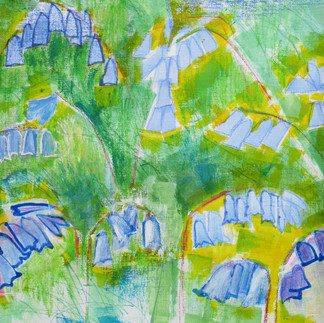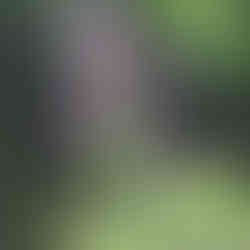April 2022
- Carolyn Thompson

- Jun 13, 2022
- 3 min read
Keats referred to the Bluebell, (or Wild Hyacinth), as ‘Saphire Queen of the mid-May’ but with the changing weather patterns and warmer winters it is now ‘Queen of mid-April’. The woods and the hedges on our track were heaving with the curly, purple bells and the heady scent of these flowers. After a few complaints from various drivers, we cut back the hedges earlier this year, (not with a flail I hasten to add) and have been gifted with a much greater number of these flowers but all over the Lizard they have been coating the woods and valleys.
The weather for April was unsettled and gave us a fortnight of cold nights with many frosts but mild weather during the day. A little rain in the early days but none of the expected and wished for April showers. Some warmer days towards the end of the month but remaining cloudy and misty. Not great for planting out the vegetables, and everything has been slow to germinate and yes, lots of slugs.
However, the birds did not seem to mind any of the weather conditions and they sang their way through April, expressing themselves in ever more glorious voice in the dawn chorus. To date we have seen (and heard), robins, blackbirds, song thrushes, blue tits, greenfinches, chaffinches, woodpeckers, wrens and a couple of sightings of jays. The wood pigeons, crows, seagulls, ravens and buzzards all fly in and out of the yard and make various attempts at the feeders but also follow the tractors ploughing up the fields around us. Apparently, this is the time of year for bats to wake up from their winter hibernation and make themselves known in the closing light of the evenings. I rarely see any bat around the yard or the outbuildings or further away in the field. I found out that bats can eat up to 3,000 insects a night, which sounds like a veritable ecocide to me but what do I know? I read that they eat the insects that we don’t want in the garden and given that my tender, young vegetable plants are being annihilated on a nightly basis, perhaps I need to set about encouraging more bats to come and live alongside us.
In addition to the Bluebells, there were many other Spring flowers out on show; Campions building up their numbers, Mugwort, Calendula, Red Dead Nettle, Hedge Parsley, Flowering Currant and growing communities of Lady’s Smock, (also known as Cuckoo Flower) and Honesty. The ‘smock’ refers to its resemblance to the little smocks that were hung out to dry, as they used to be, once a year in this season. Many insects love this plant which makes it a good sight in the field – flies, beetles, bees, butterflies and moths all sup from the flower.
I don’t recall seeing Honesty before in our garden or field but this year it was everywhere, (I wish I could say the same of our present government – hello Partygate and much more). The Latin name for Honesty is Lunaria which means ‘moonlike’ and refers to the appearance of the seedpods. Another useful plant in the foragers’ bible. The leaves can be eaten as a green vegetable or raw in salads. The seeds can be used to make a mustard substitute and the roots can be peeled and eaten. They are also a bedrock of the dried flower arrangements, as the pods turn into silver ‘pennies’ and hold this skeletal shape well. The middle layer of the seed pod is translucent allowing the seeds to be seen through it, hence its name Honesty. In East Asia, it is known as, ‘Money Plant’ but in the Netherlands, it is called ‘Coins of Judas’, alluding to the 30 pieces of silver Judas was given for betraying Jesus. Treachery in one culture and luck in another is an ongoing theme in the folklore accompanying the Honesty plant. In Yorkshire it is believed to be very unlucky and is not allowed in the house. In other parts of the country it is thought to be lucky to keep one of the ‘coins’ in your pocket. ‘Two pennies in a purse’, or ‘Money in both pockets’ are more examples of local names attributed to the luck aspect of this plant.
John Gerard, the English herbalist and writer of 'Generall Histoire of Plantes' (1597) , wrote ‘among our women it is called honesty’. Honesty it is then.







Comments